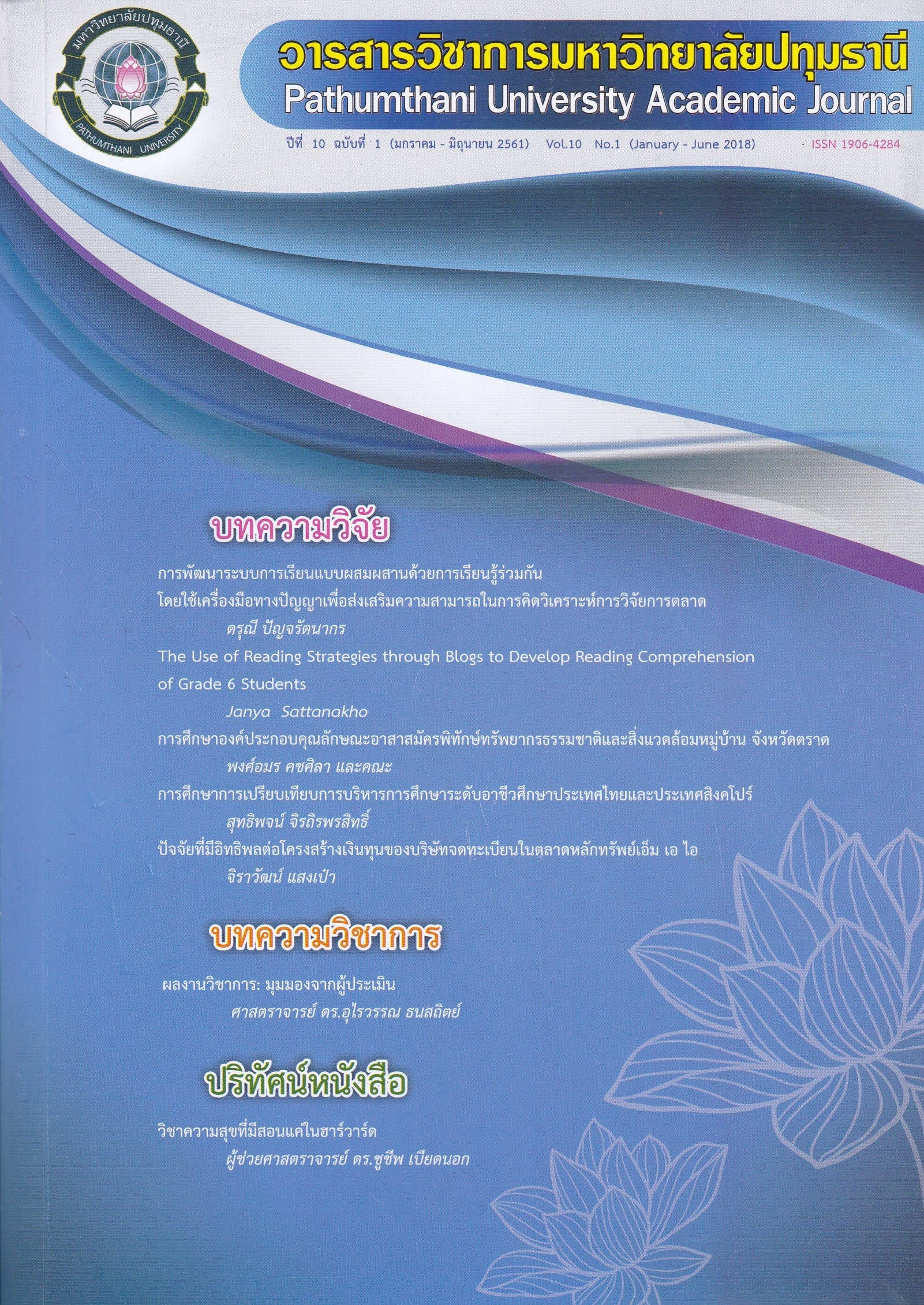Cultural Tourism Development : A case Study of Chanthakhlem Sub-district Khao Khichakut Chanthaburi Province
Keywords:
แนวทางการพัฒนา, แหล่งท่องเที่ยวเชิงวัฒนธรรมAbstract
The study on Cultural Tourism Development: A case study of Chanthakhlem Sub-district Khao Khichakut Chanthaburi Province is a Qualitative Research. The objectives of the research were, to study lifestyle, culture and traditions of indigenous communities Chanthakhlem Sub-district Khao Khitchakut Chanthaburi Province and the development a sustainable cultural tourism, by using participatory observation and interviews with key informants include parents, local community leaders, elders, scholars community and local participants and no formal interviews with people living inside Chanthakhlem Sub-district khao Khitchakut Chanthaburi Province. The study found that lineage Chong in the space of six households. Talking with Chong language and had lifestyle by using food crops, vegetables, herbs and sufficiency lifestyle. Conservation handicraft, mat dance pad coat, threshing basket, healing with a therapeutic drug of herb lineage Chong. Believe in horoscope prediction say on matters such as the holy water. These show a unique cultural and lifestyle of the lineage Chong. The study can be summarized as follows 1) Provide a proposed model to create lineage Chong and village areas. To be developed as a tourist attraction. 2) Building infrastructure Road entrance to the village, and water supply remained a problem to reach the village. 3) To create a learning center among the five District village of Chong Chanthakhlem Sub-district. 4) Assistance from government agencies and stakeholders in all sectors. 5) Creating the consciousness of the community. 6) Publicity in all forms the support from the public and private sectors as well as the various agencies involved.
References
2. ฉลองศรี พิมลสมพงษ์. (2542). การวางแผนและพัฒนาตลาดการท่องเที่ยว. กรุงเทพฯ : มหาวิทยาลยัเกษตรศาสตร์.
3. ฉัตรทิพย์ นาถสุภา. (2540). วัฒนธรรมไทยกับกระบวนการเปลี่ยนแปลงสังคม. พิมพ์ครั้งที่ 4. กรุงเทพฯ : สำนักพิมพ์จุฬาลงกรณ์มหาวิทยาลัย.
4. ชนัญ วงษ์วิภาค. (2547). การจัดการทรัพยากรทางวัฒนธรรมเพื่อการท่องเที่ยวอย่างยั่งยืน. นครปฐม : โรงพิมพ์มหาวิทยาลัยศิลปากร.
5. นภาภรณ์ หะวานนท์ และคณะ. (2550). ทฤษฎีฐานรากในเรื่องความเข้มแข็งของชุมชน. กรุงเทพฯ : ม.ป.ท.
6. บุญเลิศ จิตตั้งวัฒนา. (2548). การพัฒนาการท่องเที่ยวแบบยั่งยืน. กรุงเทพฯ : มหาวิทยาลยัธรรมศาสตร์.
7. ภูสวัสดิ์ สุขเลี้ยง. (2545). การพัฒนาแหล่งท่องเที่ยวทางวัฒนธรรม : กรณีศึกษาหมู่บ้านห้วย โป่งผาลาด อำเภอเวียงป่าเป้า จังหวัดเชียงราย. การค้นควา้แบบอิสระปริญญา ศิลปศาสตรมหาบัณฑิต สาขาวิชาการจัดการอุตสาหกรรมการท่องเที่ยว, มหาวิทยาลัยเชียงใหม่.
8. มหาวิทยาลัยสุโขทัยธรรมาธิราช สาขาวิชาวิทยาการจัดการ. (2545). เอกสารการสอนชุด วิชาการจัดการทรัพยากรการท่องเที่ยว. กรุงเทพฯ : สำนักพิมพ์สุโขทัยธรรมมาธิราช.
9. ราชบัณฑิตยสถาน. (2546). พจนานุกรมฉบับราชบัณฑิตยสถาน 2542. กรุงเทพฯ : นานมบีุคส์ พับลิเคชั่นส์,
10. เสรี พงศ์พิศ และคณะ. (2544). วิสาหกิจชุมชน : แผนแม่บทแนวคิดแนวทางตัวอย่างร่าง พระราชบัญญัติ. กรุงเทพฯ : เจริญวิทย์การพิมพ์.
11. อุษาวดี พูลพิพฒัน์. (ตลุาคม – ธันวาคม, 2545). การท่องเที่ยวแบบยั่งยืน : กรณีศึกษาการ ท่องเที่ยวเชิงนิเวศโดยชุมชนในประเทศไทย. จุลสารการท่องเที่ยว. 21(4) : 34 – 48.
Downloads
Published
How to Cite
Issue
Section
License
บทความที่ได้รับการตีพิมพ์เป็นลิขสิทธิ์ของวารสารมหาวิทยาลัยปทุมธานี
ข้อความที่ปรากฎในบทความแต่ละเรื่อง เป็นความคิดเห็นส่วนตัวของผู้เขียน กองบรรณาธิการไม่จำเป็นต้องเห็นด้วยเสมอไป และไม่มีส่วนรับผิดชอบใด ๆ ถือเป็นความรับผิดชอบของผู้เขียนแต่เพียงผู้เดียว



